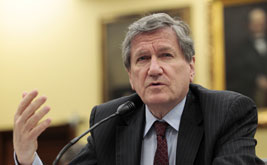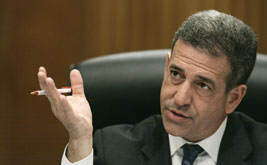Cruciverbalists Over Easy
Berkeley, Calif.
I'm a cryptic crossword constructor/editor and a member of a group of two to eight or more that has met weekends since 1982 to solve Frank Lewis's puzzles over breakfast.
As an American cryptic crossword constructor, Lewis stood alone: he was in this business far longer than any of us, he constructed more cryptics than any of us and his puzzles were exceptional [Judith Long, "A Puzzler's Puzzler," Dec. 20].
Easy cryptic crosswords limit themselves to a narrow vocabulary and have a rigid cluing style that makes them trivial and, to be honest, boring for experienced solvers. Difficult cryptics are impenetrable to beginners. But Lewis's puzzles have a unique freewheeling quality—he adhered to his own rules, and his clues were the great equalizer, challenging to the experienced and beginners alike. Also, his entries encompassed a vast vocabulary and many areas of knowledge. For these reasons, Lewis's cryptics were ideal for group solving. We often cursed him, but we never got tired of his puzzles. As my cryptic colleague Joshua Kosman put it, Lewis was "candid, ageless at heart and uncannily wise. (5,5)"
HENRI PICCIOTTO
Boulder, Colo.
Ah, the sad state of classical education, even among our heroes. I'm afraid there is confusion in the crossword puzzle of December 20, 1975, reprinted in the December 20, 2010, issue. The answer to 8 down—"Lucius to Horatius, or perhaps East if one is West (6,7)"—is clearly "bridge partner." But Lucius was certainly not that to Horatius. The author confused Publius Horatius Cocles and Lucius Tarquinius Superbus, who were not partners (see Thomas Babington Macaulay's epic poem Horatio at the Bridge, about the classic battle, ca. 505 BC), with Marcus Horatius Barbatus and Lucius Valerius Potitus, who were Roman consuls somewhat later, and might have walked across a bridge together, but are hardly known for it.
SIDNEY SHINEDLING
¡No CIR!
Jackson, Miss.
An addendum to Roberto Lovato's letter in the last issue ["Exchange," Jan. 24]: the biggest problem faced by the Washington advocates of Comprehensive Immigration Reform (CIR) was that they wrote and promoted terrible immigration bills, which have faced widespread rejection by the immigrant communities and workers they were supposed to help.
Grassroots groups like the Mississippi Immigrants Rights Alliance (MIRA) that are fighting raids, detentions, deportations and mass firings recoiled from bills that increased enforcement. Nothing, not even withered promises of legalization, could convince activists that more enforcement is a good idea.
Last year 400,000 people were deported, and thousands were fired from their jobs. How could the DC lobbyists spearhead a campaign to stop the administration's enforcement policy, when their own bills called for more enforcement? As movement activists sat down at the gates to detention centers, what lobbyists would want to come
explain why their bills treated mass detention as a permanent fact of life?
From the beginning, the CIR bills refused to address the root causes of migration—the trade agreements and structural adjustment plans that produce high corporate profits in countries like Mexico but force millions of farmers and workers to leave home. CIR advocates sought a strategic alliance with employers based on forcing future migrants into guest-worker or contract labor programs. Since changing trade policy would meet fierce opposition by CIR's employer backers, the DC groups chose to ignore these root causes.
The CIR bills failed because they lacked popular support. Yet major foundations poured millions of dollars into those failed efforts while grassroots movements everywhere scratched around for resources to fight deportations, firings, guest-worker abuses, local anti-immigrant legislation and bad trade policy.
A social movement for immigration reform isn't built by legislative strategists in Washington. It comes from people fighting in communities all over the country. They can and will make possible tomorrow what's considered politically impossible today.
Fortunately, outside DC many organizations have clear alternatives to the CIR bills. The Dignity Campaign has one detailed proposal. Community2Community has been organizing dialogues throughout Washington State to formulate another. The Binational Front of Indigenous Organizations makes its own proposal for progressive reform for the United States while advocating the "right to not migrate" in Mexico. In Mississippi, MIRA pioneered a coalition of African-American and immigrant communities, fighting the racists to a standstill in our legislature while advocating a rights-based reform.
The CIR bills and the strategy behind them are dead, at least for a while. It's time to listen to people building the movement outside Washington.
BILL CHANDLER, executive director
Mississippi Immigrants Rights Alliance
In Orbit
Santa Cruz, Calif.
I am so grateful for Marilynne Robinson's brilliant essay on William James ["Risk the Game," Dec. 13]. I had not read James since my college days and had forgotten the enormous pleasure of being awarded a meaningful position in the bewildering universes of thought and the cosmos. Reading Robinson's exquisite presentation of James's thought has filled me with a kind of joy and release that, at nearly 80 years of age, I had not expected to feel again from the written word. I will now reread James with more love and comprehension.
JAN HARWOOD
It's a Bone! It's a Bane! It's...
Juneau, Alaska
Re the verse inspired by Calvin Trillin's deadline poem on John Boehner ["Letters," Jan. 3; Nov. 29]: I'm reminded yet again of the liar's gift for corrupting language. The clown's name is BONER, no matter how long he pretends it's BANER. More doublespeak in days of universal deceit. As Orwell knew, "truth-telling is a revolutionary act."
KARL SCHOEPPE (pronounced Shep-ee)
Back to the Future
A production error caused a random "2" to appear in Elaine Blair's "Trakt Marks" in last week's issue. Ian Frazier returned to Siberia in 1999, not 12999. Read More
Our Readers










